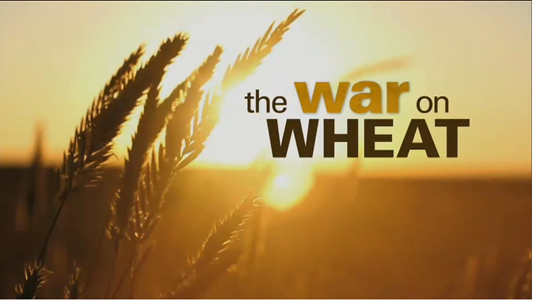Share This
Last week I watched an episode of the Canadian Broadcasting Company’s investigatory program The Fifth Estate, called The War on Wheat. In this excellent program, journalist Mark Kelley interviews William Davis, author of Wheat Belly, and talks to a range of other experts about the claims Davis makes in his book – that wheat makes you fat, that today’s wheat is genetically modified Frankenwheat, that wheat causes “70-80% of all known diseases,” and so on. (See our Myths Busted page.)
That’s a lot of blame to put on one crop – especially one that provides 20% of the world’s food. As Kelley demonstrates throughout the program, the evidence for Wheat Belly’s claims is thin to non-existent. And yet, Davis’ book is a best seller. Check out a new book called “The Unpersuadables – Adventures with the Enemies of Science” if you’d like some insight into why people’s brains make them flock to books like this, absent any solid evidence.
What I found most poignant, though, was when, at several points in the program, Kelley asks ordinary people why they’ve given up wheat. They all say some variation of, “Because I feel better. Because my body tells me it works.”
I don’t doubt the sincerity of these people, and I think it’s important for people to pay attention to the messages their bodies send them. I’m glad they’re feeling good, and I wouldn’t take that away from them. My reaction, however, is “compared to what?” How were these people eating before they gave up wheat?
Giving up wheat (or gluten) means radically changing the way you eat. You must be mindful of every morsel you put in your mouth, and most processed convenience foods are off limits. You’ll find yourself cooking more often, and most likely eating more fruits and vegetables than before. You’ll probably eat less than before, too, since many of your favorite comfort foods will be (literally) off the table. No wonder you feel better, have more energy, and lose weight, if you’ve been eating anything like the standard Western diet.
Here’s Oldways’ challenge to anyone who’s considering giving up wheat, gluten or (in Paleo fashion) all grains: Before you do so, try simply eating real food, and nothing but real food, for at least a month.
Fill your plate with whole grains, vegetables, legumes, fruits, dairy, meat, fish, eggs – as much variety as possible of your favorite real foods. Skip the added sugar, fast food, boxed mixes – anything with ingredients you can’t pronounce or recognize. (You’ll want to skip the food additives too, after you read this preliminary mouse study about their potential impact on inflammation and obesity.) Make your own salad dressings, have fruit for dessert. Drink plenty of water as your go-to beverage. Recipes on the Oldways and WGC websites will help!
Chances are high that such a diet – summed up in Michael Pollan’s immortal words “Eat food. Mostly plants. Not too much.” – will make you feel better without giving up whole food groups that people around the world have enjoyed for eons. Simply eat real food, then come back in a month and add your comments to this blog. (Cynthia)
P.S. For anyone convinced that banishing wheat will transform your physical appearance and melt belly fat, keep in mind as you watch The War on Wheat that fit narrator Mark Kelley consumes wheat, and Dr. Davis does not. The whole concept of a physical “wheat belly” appears to be more about book sales than substance.


Comments
The way bread is made is important to many of us. I would suggest shopping at a local bakery, if there's one near you, because supermarket bread will always have extra ingredients to fit the long time it spends in distribution. The bread I buy at the bakery has just 11 understandable ingredients: Organic whole wheat flour, water, sprouted organic wheat berries, molasses, gluten, cornmeal, flax, sesame, barley, yeast, salt. You may even want to try baking your own bread some day, to control the ingredients to your satisfaction.
Add a Comment